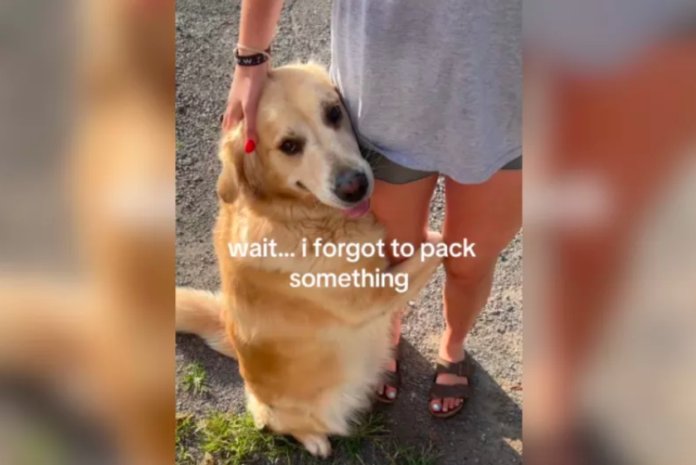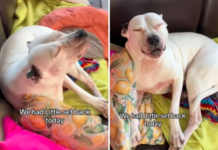Last Updated on August 28, 2024 by Fumipets
Dog’s Heartbreaking Reaction to College Student Leaving for School: A Deep Dive into Pet Separation Anxiety
As college students across the United States prepare to leave home and embark on their academic journeys, many face the heartbreaking reality of leaving their beloved pets behind. One recent viral TikTok video has captured this emotional moment, highlighting the deep bond between a young woman and her loyal dog. This story not only reflects the strong connection between pets and their owners but also brings attention to the growing issue of pet separation anxiety among college students.
The Viral Moment: Dog Refuses to Let Go
In a tear-jerking TikTok video, Kaylee Ziobro, a college student, shared her dog Bailey’s reaction as she prepared to leave for school. The video, posted under the username @kaylee.ziobro, has since garnered over 28 million views, resonating with viewers worldwide.
As Kaylee packed her bags for college, Bailey, the family dog, clung tightly to her leg, seemingly understanding that this was more than just a routine goodbye. The caption read, “She won’t let go,” perfectly encapsulating the emotional bond between the two. The heartwarming yet heartbreaking scene struck a chord with many viewers, prompting reactions filled with empathy and emotion.
Reactions from the Online Community
The video’s impact extended beyond its visual appeal, as people flooded the comments section with their thoughts and feelings. Many viewers expressed how the video touched their hearts, with some even questioning if Kaylee stayed home after seeing her dog’s reaction. One commenter, Finn, wrote, “Are you joking right now? Please tell me you stayed.” Another viewer, Jailynn, added, “The way I’d unpack the car so fast.”
Other comments echoed similar sentiments, with Lain stating, “Time to unpack,” and Tatyanaxchanel sharing, “The way this would make me cry uncontrollably.” The overwhelming response highlights the universal connection people share with their pets and the difficulty of parting ways, even temporarily.
The Emotional Toll of Leaving Pets Behind
For many college students, leaving home for the first time can be a challenging experience. The excitement of starting a new chapter in life is often accompanied by feelings of sadness and anxiety, especially when it comes to leaving behind family pets. This bittersweet reality is something that Kaylee, like many others, faced as she prepared to leave for college.
Separation Anxiety in College Students and Their Pets
A study conducted by Washington State University in 2021 revealed that a significant number of college students experience separation anxiety when leaving their pets behind. The study surveyed around 150 incoming first-year students with pets, and the findings were eye-opening:
- 75% of students reported some level of separation anxiety when being away from their pets.
- 25% of students experienced moderate to severe symptoms of this anxiety.
- Students with dogs were more likely to report higher levels of attachment and separation anxiety compared to those with cats or other pets.
The study also noted that 81% of the respondents were women, a statistic that aligns with the trend of higher female enrollment in college, where 60% of students are female.
The Impact on Pets
While the focus is often on the students, it’s important to acknowledge the impact on the pets as well. Dogs, in particular, are known for their loyalty and strong attachment to their owners. When left behind, they can experience their own form of separation anxiety, which may manifest in behaviors such as excessive barking, destructive tendencies, or a loss of appetite.
In Bailey’s case, her refusal to let go of Kaylee’s leg is a clear sign of her distress and desire to keep her owner close. This behavior is not uncommon in dogs who sense a significant change, such as their owner leaving for an extended period.
Pet-Friendly Colleges: A Solution for Some
For most students, leaving their dog behind while they go to college is a rite of passage, as approximately 96% of colleges in the U.S. do not permit pets on campus. However, there are a few exceptions. Some colleges are becoming more pet-friendly, recognizing the importance of pets in students’ lives.
Colleges That Allow Pets
- Clarion University
- Pfeiffer University
- Johnson & Wales University
These institutions allow dogs and other pets in designated areas or specific dorms, providing a solution for students who can’t bear to part with their furry companions.
Coping Strategies for Students and Pets
For those attending colleges that do not allow pets, coping with the separation can be difficult. However, there are strategies that both students and their pets can use to ease the transition:
- Video Calls: Regular video calls with their pets can help students stay connected and provide comfort to their pets, who may feel reassured by seeing and hearing their owner’s voice.
- Comfort Items: Leaving behind a piece of clothing or a blanket with the student’s scent can help soothe the pet during the separation.
- Routine Visits: Whenever possible, students can plan visits home to spend time with their pets and maintain that important bond.
Another Heartbreaking Goodbye: Similar Stories
Kaylee and Bailey’s story is not unique. Many other college students have shared similar experiences of their pets reacting emotionally to their departure.
Last week, another college student shared a video of his dog’s reaction to seeing the car filled with belongings as he prepared to leave for college. The dog’s heartbroken expression mirrored Bailey’s, further emphasizing the strong emotional connection between pets and their owners.
The Science Behind Pet Separation Anxiety
Separation anxiety in pets is a well-documented phenomenon. Dogs, in particular, are social animals that form strong attachments to their owners. When these bonds are disrupted, pets can experience anxiety and stress. This anxiety can be particularly pronounced in situations where the owner is absent for extended periods, such as when leaving for college.
Signs of Pet Separation Anxiety
- Excessive barking or howling
- Destructive behavior, such as chewing on furniture or shoes
- Pacing or restlessness
- Loss of appetite
- Attempts to escape or follow the owner
Understanding these signs can help pet owners take proactive steps to alleviate their pet’s anxiety and make the separation process easier for both parties.
Final Thoughts: The Unbreakable Bond Between Pets and Their Owners
The viral video of Kaylee and Bailey serves as a poignant reminder of the unbreakable bond between pets and their owners. While the transition to college life can be challenging, the love and connection shared with pets remain a constant source of comfort and joy. As more colleges recognize the importance of pets in students’ lives, perhaps we’ll see a future where more institutions open their doors to these beloved companions.
Frequently Asked Questions (FAQs)
1. What are some signs that my dog is experiencing separation anxiety?
Signs of separation anxiety in dogs include excessive barking, destructive behavior, pacing, loss of appetite, and attempts to escape or follow their owner.
2. How can I help my dog cope with separation anxiety when I leave for college?
You can help your dog cope by leaving behind comfort items with your scent, arranging for regular video calls, and planning routine visits home to spend time with them.
3. Are there any colleges that allow pets on campus?
Yes, some colleges, such as Clarion University, Pfeiffer University, and Johnson & Wales University, allow pets in designated areas or specific dorms.
4. Why do dogs experience separation anxiety more than other pets?
Dogs are social animals that form strong attachments to their owners. Their loyalty and need for companionship make them more prone to separation anxiety compared to other pets like cats.


















